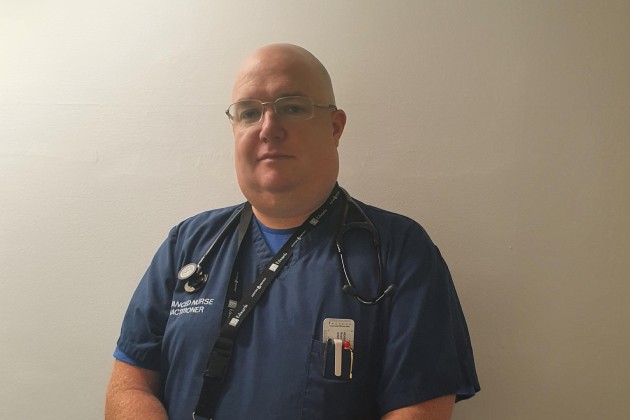Being an active member of the RCN has taught me that if you want things to change, you have to make them change.
I know that standing beneath RCN banners and holding placards can be intimidating – even for us RCN stewards. But in my experience, most members of the public are keen to listen and support our campaigns.
The following steps can help you prepare to talk about our Fair Pay for Nursing campaign and why a pay rise for nursing staff is long overdue.
1. Keep it personal
Your words will be more powerful if they resonate with people, so drawing on personal experience is key. I often explain how exhausted nursing staff are – and that they have been for a while. We are so beaten down by pay, work, and just trying to get through the next shift. The past 18 months have pushed us to our limit.
I tell people that I love my job, but it’s so devalued – a lot of people have no concept of what modern nursing looks like, and unfortunately you may find yourself explaining your job to them.
It’s not unusual for me, as an RCN steward, to ask a junior nurse how they’re doing and have them burst into tears. I’ve got experienced and inexperienced nursing staff breaking down in front of me.
2. Mention staff shortages
Put simply, without the staff to run hospitals, surgeries, or community services, the NHS won’t function.
Nursing is becoming much more technical. The responsibilities and skills that we have are increasing constantly, and this is not reflected in our job descriptions or in the pay that we receive.
We’re losing nursing staff, particularly experienced staff, which leaves others with less experience with very little support to help them develop.
Now is the time to pay us what we’re due
COVID-19 has been devastating, and I know a lot of nursing staff are thinking that continuing their career isn’t worth it. The cons are starting to outweigh the pros.
Someone might argue that there is a record number of nursing students going into university – while that’s true, a large percentage of them will drop out in the first 12 months.
There aren’t enough placements for them, there’s not enough support for them, and the attrition rate in newly qualified nurses is high.
It takes years for nursing staff to grow into skilled professionals, and while our newly qualified staff are extremely valuable, we need a mixture of experience for services to run well.
Some people might mention that thousands of jobs have been lost this year, why should nursing be prioritised? I say there are 100,000 vacancies in the NHS. It is one of the UK’s biggest employers, and its staff need protecting.
It takes years for nursing staff to grow into skilled professionals
3. Focus on figures
If you’re talking to the public, you need to have an answer to the question: “where is the government going to find the money for a pay rise?”
My answer is that investing in the future of our health service is a political choice. A report by London Economics shows a decent NHS pay rise is affordable and would bring about an economic boost. Their analysis finds that 81% of the initial cost of a 10% pay rise would be recouped by the Exchequer. See my list of useful links at the end of this article to find out more.
4. Break down the benefits
Any additional money you give nursing staff isn’t going into savings accounts, it’ll be spent.
Nursing staff have got bills to pay, clothing to replace, food to buy. We’ve got all the usual stuff that everyone spends money on. This money is typically spent in the local economy, supporting private sector jobs and small businesses.
So, by the public supporting our 12.5% pay increase, they’re actually supporting their own jobs, economies and communities.
For me, getting that message across to the public has helped them understand how a pay rise can benefit more than just nursing staff.
5. Tell them why
One of the things that nursing has taught me is how to communicate with people.
A few banners and placards are a good way of getting someone’s attention. When I want to start a conversation, I ask anyone who looks interested if they want to know more.
Once they’re engaged, I tell them:
- Why we’re here: we’re asking for a pay increase for nursing staff in the NHS.
- Why we want one: the government has told us we can have a 3% pay rise – but this doesn’t cover the past 11 years of austerity.
- Why nursing staff: during the majority of that 11-year period, nursing staff have understood that they needed to do their bit. But we’ve done our bit now and over that time we’ve only had sub-inflation pay increases. This means that nursing staff are worse off now than they were 11 years ago.
- Why now: we’ve seen our workload increase, the number of nursing vacancies rise, less take-home pay while inflation rises, and we’ve just withstood the immense pressure of a pandemic. Now is the time to pay us what we’re due.
Get the information out there. Speak to your family, to your friends, and ask them to speak about it too. Keep the conversation going.

Useful links
- Take a look at this chart from the Nuffield Trust showing how nursing pay compares to inflation.
- Here is a London Economics report on the positive impact of an NHS pay rise on the economy.
- You can read more about the affordability of an NHS pay rise from this accountancy expert's blog.
- Our Fair Pay for Nursing campaign aims to secure a fully funded 12.5% pay increase for all nursing staff covered by Agenda for Change terms. How the governments in the UK respond to this demand will indicate what they believe nursing colleagues across the independent sector deserve too.
- Visit our webpage for more information on our campaign.








